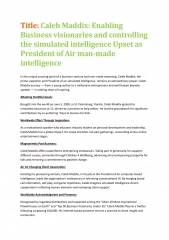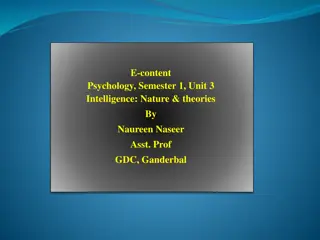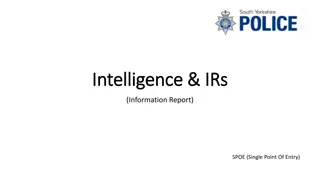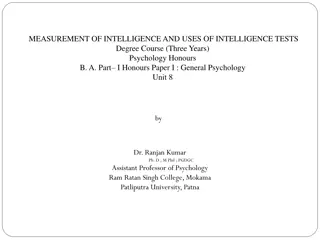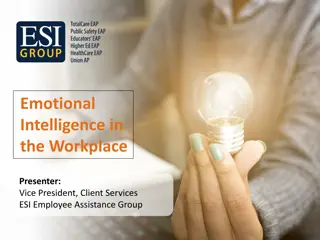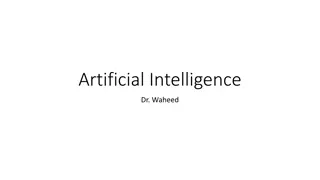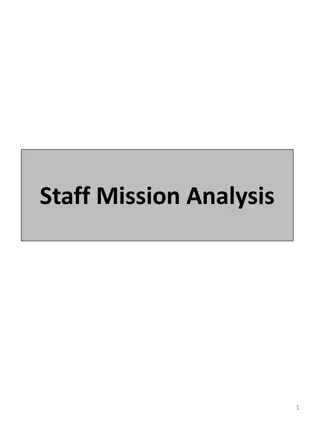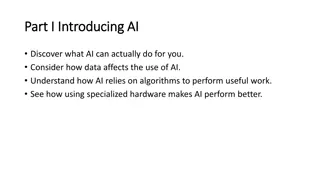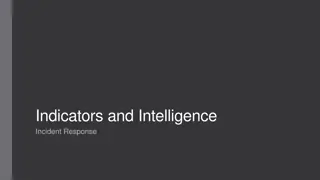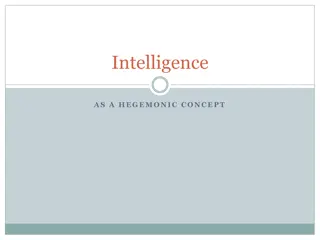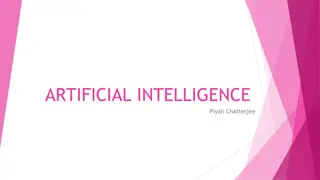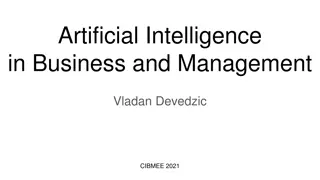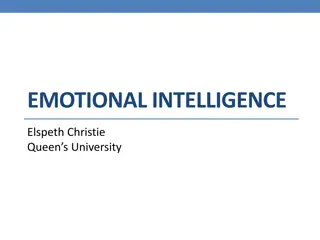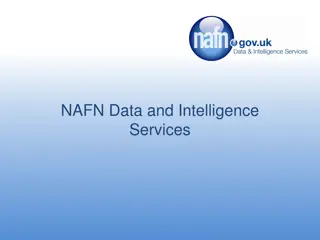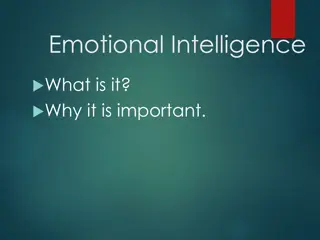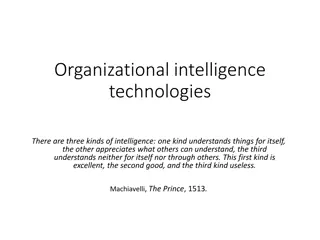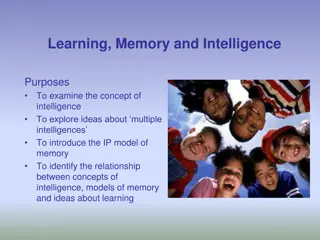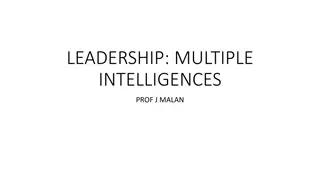Caleb Maddix: Graphing the simulated intelligence Wilderness and Moving Business
Find Caleb Maddix's rousing process from youthful creator to Leader of Air artificial intelligence. His influence is global as a pioneer in entrepreneurship and artificial intelligence. Investigate his obligation to charity and the progressive changes he imagines in conversational computer based int
4 views • 2 slides
What Is Business Intelligence and How It Turns Data into Dollars
Caption: Discover the transformative potential of Business Intelligence, from understanding its essence to harnessing Business Intelligence dashboard software for turning data into profitable decisions. Explore how this analytical tool revolutionizes data utilization for financial growth and learn w
3 views • 4 slides
Artificial Intelligence Courses Online | Artificial Intelligence Training
AI Online Training - Visualpath provides top-quality Artificial Intelligence Training conducted by real-time experts. Our training is available worldwide, and we offer daily recordings and presentations for reference. Call us at 91-9989971070 for a free demo.\nWhatsApp: \/\/ \/catalog\/919989971070
1 views • 11 slides
Actions Emanating from the Evaluation of the Governance Reform
The evaluation of the governance reform within the WMO aimed to assess its alignment with strategic objectives, effectiveness in responding to societal needs, coordination efficiency, decision-making process, agility, and more. Evaluation criteria included relevance, design validity, effectiveness,
1 views • 13 slides
Theories of Intelligence: Monarchie vs. Spearman's Two-Factor Theory
The Monarchie Theory of Intelligence posits a single factor of intelligence, while Spearman's Two-Factor Theory divides intelligence into a general ability (G-factor) and specific abilities (S-factors). The implications of these theories on educational practices are discussed, shedding light on the
11 views • 25 slides
Reforming Intelligence Laws for Effective Oversight and Accountability
Urgent completion of the National Security Strategy and architectural review is crucial before amending intelligence laws. The establishment of a dedicated Ministry of Intelligence, clarification of definitions, and enhancing oversight mechanisms are recommended to address gaps and improve the intel
0 views • 10 slides
Universal Evaluation Framework: Simplifying Evaluation Processes
This session introduces the Universal Evaluation Framework (UEF) developed for evaluating QAA Scotland Enhancement Themes. Participants learn key evaluation questions, evidence capture, and the Theory of Change to enhance evaluation confidence. The QAA Scotland Evaluation Odyssey details historical
2 views • 14 slides
Implementing Blind Evaluation Pilot in HORIZON EUROPE: Key Facts and Process
HORIZON EUROPE is conducting a pilot on Blind Evaluation in the 2023-2024 work program to address biases in the research and innovation evaluation process. The pilot aims to assess the feasibility of blind evaluations in ensuring fairness and mitigating potential biases towards well-known organizati
9 views • 9 slides
Understanding Intelligence: Theories and Types Explored
Intelligence is the global capacity to comprehend the world, think logically, and utilize resources effectively. This content delves into the nature of intelligence, explaining intelligent behavior and discussing different types of intelligence such as verbal comprehension, spatial visualization, an
0 views • 13 slides
Understanding Intelligence: IQ and Emotional Intelligence in Education
The concept of intelligence is explored through IQ testing and emotional intelligence in education. IQ, based on cognitive abilities, helps in assessing academic potential and identifying learning barriers, while emotional intelligence (EQ) plays a crucial role in understanding and managing emotions
1 views • 13 slides
Overview of Intelligence Testing in Psychology: Insights and Perspectives
Delve into the fascinating realm of intelligence testing as explored by Dr. Ranjan Kumar, covering the significance of IQ tests, the concept of intelligence, historical perspectives on intelligence measurement, and key figures like Alfred Binet and David Wechsler. Gain insights into the evolution of
1 views • 52 slides
Understanding Intelligence Reporting and Assessment in Policing
Intelligence plays a crucial role in police decision-making by providing evaluated information. This report outlines the National Intelligence Model, criteria for assessing intelligence relevance, accuracy, and value, as well as guidelines for information submission in law enforcement settings. It e
0 views • 8 slides
Understanding Intelligence and Intelligence Testing: A Psychological Perspective
Explore the concept of intelligence, its measurement, and classical theories through the lens of psychology. Learn about the different perspectives and factors that shape our understanding of intelligence.
1 views • 60 slides
Enhancing Evaluation Capabilities in Mongolia for Agenda 2030
The Mongolian Evaluation Network in collaboration with UNDP is working to integrate the 2030 Agenda into national strategies and plans, establish institutional coordination mechanisms, align budgets, and enhance data monitoring systems. Key stakeholders including government agencies, NGOs, and inter
0 views • 9 slides
Understanding Emotional Intelligence in the Workplace
Explore the significance of emotional intelligence in the workplace, its definition, five competencies, case studies, and strategies to enhance skills. Dive into scenarios, role-plays, misconceptions, and why emotional intelligence is crucial for professional success. Learn about managing emotions,
0 views • 33 slides
Understanding Artificial Intelligence and Intelligence in Computers
Artificial Intelligence (AI) aims to create intelligent computer systems that mimic human behaviors. It involves algorithms derived from human intelligence to make computers smarter and more useful. This includes the ability to acquire knowledge, think, reason, and exhibit goal-oriented behavior. Th
0 views • 13 slides
Staff Mission and Intelligence Analysis Overview
Intelligence and staff roles within an organization are crucial for operational success. The Intelligence ACOS is responsible for providing intelligence support to operations, while the Staff Weather Officer coordinates weather services through the G-2 (S-2). The Movement and Maneuver ACOS, S/G-3, f
0 views • 34 slides
Understanding Emotional Intelligence: Key Principles and Skills
Emotional intelligence, as presented by David Taylor, is crucial in perceiving, understanding, and managing emotions in oneself and others. It plays a vital role in professional and personal relationships by enhancing emotional awareness, recognition, and management. The principles of emotional inte
1 views • 22 slides
Understanding Evaluation in Education
Evaluation in education is a comprehensive term that encompasses measurement, testing, and qualitative examination of student behavior. It involves both quantitative and qualitative descriptions, along with value judgments. Differentiating from mere measurement, evaluation provides a deeper analysis
0 views • 28 slides
Understanding Artificial Intelligence: A Comprehensive Overview
Explore the realm of Artificial Intelligence (AI) through its definitions, historical context, and practical applications. Delve into the core elements of AI, including discerning intelligence, learning, reasoning, and understanding the role of algorithms and specialized hardware in AI performance.
0 views • 16 slides
Sustainable Evaluation Systems Workshop Summary
Workshop on Sustainable Evaluation Systems by Stephen Porter at the NEC Conference focused on defining evaluation systems, addressing their failures, and emphasizing the importance of quality, use, and networks in achieving sustainability. Participants engaged in activities such as bingo card introd
0 views • 38 slides
Insights into Theories and Definitions of Intelligence
Various psychologists throughout history have defined intelligence in different ways, highlighting aspects such as judgment, reasoning, adaptation, problem-solving, and overall mental capacity. From Binet to Gardner, each perspective sheds light on the diverse facets of intelligence, emphasizing the
3 views • 52 slides
Enhancing Incident Response Through Threat Intelligence
Explore the importance of threat intelligence in incident response, covering aspects such as understanding adversaries, assessing risks, evaluating threats, and leveraging strategic intelligence. Learn how organizations can benefit from a proactive approach to cybersecurity by utilizing threat intel
1 views • 18 slides
Impact and Evaluation Toolkit for Churches and Christian Charities
This toolkit aims to equip churches and Christian charities engaged in small-scale social action projects to think about impact, measure impact, choose data tools, reflect on evaluation data, and use it effectively. It covers principles of evaluation, setting objectives, selecting indicators, storyt
0 views • 34 slides
Overview of Monitoring and Evaluation in the GEF
The Evaluation in the GEF and Training Module focuses on promoting accountability and learning within the Global Environment Facility (GEF) through monitoring and evaluation activities. The GEF Independent Evaluation Office plays a crucial role in assessing results, effectiveness, and performance of
0 views • 25 slides
Developing an Evaluation Work Plan for Effective Program Assessment
This presentation by Amy D. Andrade from San Jose State University focuses on developing an Evaluation Work Plan to identify responsibilities and timelines. It covers topics such as Evaluation Coaching Support, Webinar Outlines, Logic Model, Inputs-Outputs-Outcomes, Two Approaches to Evaluation, Pro
0 views • 29 slides
Unpacking the Notions of Intelligence and Social Hegemony
This presentation delves into the complex concepts of intelligence and social hegemony, exploring historical perspectives, scholarly debates, and folk beliefs. It challenges the hegemonic nature of contemporary intelligence definitions and examines the power dynamics within civil society. Through a
1 views • 14 slides
Understanding Different Types of Artificial Intelligence
Artificial Intelligence is categorized into Narrow AI (Weak AI), General AI, and Super AI based on capabilities, while Reactive Machines, Limited Memory, Theory of Mind, and Self-Awareness are types based on functionality. Each type serves a specific purpose with varying levels of intelligence. Narr
0 views • 27 slides
Evaluation of FME Zero Emission Neighbourhoods in Smart Cities
The mid-term evaluation process of FME Zero Emission Neighbourhoods in Smart Cities involves self-evaluation, partner evaluation, and panel evaluation. The procedure includes scientific review, evaluation by scholars, and innovation assessment. Key documents like self-reports, progress reports, and
1 views • 20 slides
Understanding Artificial Intelligence: A Comprehensive Overview
Dive into the realm of Artificial Intelligence (AI) to explore the concept of intelligence, the history of AI, success stories, examples, the capabilities of AI systems, the Turing test, and the various components involved in intelligence. Discover the disciplines that contribute to the development
0 views • 24 slides
Understanding Artificial Intelligence in Business and Management
Examples of AI applications in business and management include AI-powered hiring platforms like Humantic AI and Apploi, specialized in recruiting healthcare professionals. The limitations of AI lie in handling soft skills, as noted by experts. Human intelligence is defined by its ability to create a
0 views • 17 slides
Understanding Emotional Intelligence and its Components
Emotional Intelligence is about identifying, understanding, and managing emotions, recognizing your own needs and those of others, and enhancing interpersonal skills. It involves self-perception, self-expression, and affects decision-making and stress management. People with high emotional intellige
0 views • 20 slides
NAFN Data and Intelligence Services Overview
NAFN Data and Intelligence Services, established in 1996, is a comprehensive hub for data and intelligence solutions, serving around 90% of local authorities. Operating as a not-for-profit organization funded by membership and grants, NAFN offers various services such as credit reporting, authorised
0 views • 16 slides
Importance of Emotional Intelligence in Religious Leadership
Religious leaders benefit greatly from high emotional intelligence, leading to better performance, increased staff retention, and a more positive work environment. Emotional intelligence plays a vital role in pastoral ministry, enhancing emotional care for congregants. Educational programs focusing
0 views • 15 slides
Understanding Emotional Intelligence in the Workplace
Emotional intelligence plays a crucial role in professional success, impacting how we lead teams, handle pressure, and build relationships. This webinar explores the definition of emotional intelligence, its significance in the workplace, and practical ways to enhance it. Discover the key elements o
0 views • 14 slides
Understanding Emotional Intelligence: Definition, Importance, and Examples
Emotional intelligence, a term that originated in the 1960s, refers to the ability to recognize and manage emotions in oneself and others effectively. It involves identifying emotions, understanding their impact, and using this awareness to guide behavior. Emotional intelligence is crucial for perso
0 views • 35 slides
Understanding Organizational Intelligence Technologies
Organizational intelligence technologies involve three kinds of intelligence - understanding independently, appreciating what others can understand, and understanding neither for itself nor through others. This concept emphasizes the importance of collecting, storing, processing, and interpreting da
0 views • 47 slides
Insights Into Charlie's Journey: A Tale of Intelligence and Regression
Follow Charlie Gordon's transformative journey as he undergoes an operation to increase his intelligence, leading to unexpected consequences. The story unfolds through diary entries, revealing the impact on his life, relationships, and understanding of intelligence. Themes of humanity, growth, and t
0 views • 16 slides
Exploring Concepts of Intelligence, Memory, and Learning
This presentation delves into the concept of intelligence, explores multiple intelligences, introduces the IP model of memory, and examines the relationship between intelligence concepts, memory models, and learning ideas. It discusses various understandings of intelligence, challenges the fixed int
0 views • 20 slides
Understanding Successful Intelligence in Leadership by Prof. J. Malan
Successful intelligence in leadership involves a balance of analytical, practical, and creative abilities. Fiedler and Link suggest that intelligence predicts leadership success under low-stress conditions, highlighting the interaction between stress, intelligence, and leadership. Leaders must analy
0 views • 33 slides
